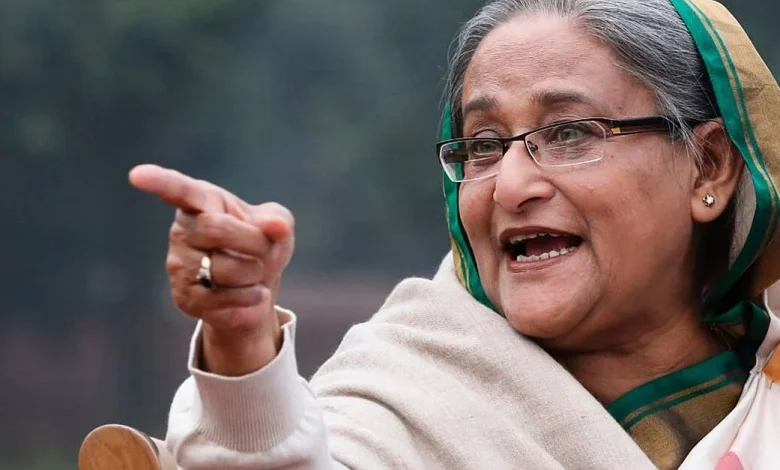Bangladesh tribunal sentences ousted leader Sheikh Hasina to death

A special tribunal has sentenced Bangladesh’s ousted prime minister Sheikh Hasina to death on charges of crimes against humanity for her crackdown on a student uprising last year that killed hundreds of people and led to the toppling of her 15-year rule.
The Dhaka-based International Crimes Tribunal also sentenced former home minister Asaduzzaman Khan to death for his involvement in the use of deadly force against protesters.
Both Hasina and Khan fled to India last year and were sentenced in absentia.
Bangladeshi army soldiers stand guard outside the Supreme Court ahead of the verdict against ousted prime minister Sheikh Hasina in Dhaka, Bangladesh (Rajib Dhar/AP)
A third suspect, a former police chief, was sentenced to five years in prison after becoming a state witness against Hasina and pleading guilty.
Hasina and Khan were accused over the killing of hundreds of people during a student-led uprising in July and August 2024.
The country’s health adviser under the current interim government said more than 800 people were killed and about 14,000 were injured.
However, the United Nations in a February report said up to 1,400 may have been killed.
Hasina said the charges are unjustified, arguing that she and Khan “acted in good faith and were trying to minimise the loss of life”.
“We lost control of the situation, but to characterise what happened as a premeditated assault on citizens is simply to misread the facts,” she said on Monday in a statement denouncing the verdict.
“I mourn all of the deaths that occurred in July and August of last year, on both sides of the political divide,” Hasina said.
“But neither I nor other political leaders ordered the killing of protesters.”
Army soldiers in riot gear stand guard in Dhaka, Bangladesh (Rajib Dhar/AP)
Hasina cannot appeal against the verdict unless she surrenders or is arrested within 30 days of the judgment.
The verdict comes as the country still grapples with instability after Hasina was ousted on August 5 2024.
Bangladeshi Nobel Peace Prize laureate Muhammad Yunus took over as the head of an interim government three days after her fall.
Mr Yunus has vowed to punish Hasina and banned the activities of her Awami League party.
A three-member tribunal, headed by Justice Golam Mortuza Mozumder, announced the tribunal’s ruling, a session that was broadcast live.
Some of those in the packed courtroom cheered when Justice Mozumder announced the death penalty for Hasina.
He admonished them, telling them to express their feelings outside the courtroom.
Many families of the killed and the injured during last year’s uprising waited for hours outside the tribunal ahead of the verdict.
Protesters during a stand-off with police outside the demolished residence of Sheikh Mujibur Rahman, Bangladesh’s former leader and the father of the country’s ousted prime minister Sheikh Hasina, in Dhaka (Rajib Dhar/AP)
Hasina’s son Sajeeb Wazed, currently in the United States, said in a message to The Associated Press that the “verdict is a joke and meaningless. My mother is safe in India. The trials were so legally flawed they won’t survive any challenge once rule of law returns to Bangladesh”.
In a media statement on Monday, Bangladesh’s Ministry of Home Affairs urged India to send both Hasina and Khan back soon.
India’s Foreign Ministry in a statement acknowledged the tribunal’s verdict but fell short of stating whether it would hand them over to Dhaka.
“As a close neighbour, India remains committed to the best interests of people of Bangladesh, including in peace, democracy, inclusion and stability in that country. We will always engage constructively with all stakeholders to that end,” it said.
India previously had not responded to requests by Bangladesh to extradite Hasina and Khan to stand trial.
India’s failure to extradite the pair has created some tensions between the neighbouring nations.
Tensions and disruptions had grown in the country in recent days ahead of the verdict.
Nearly 50 arson attacks, mostly targeting vehicles, and dozens of explosions of crude bombs were reported nationwide over the past week.
Protesters shout slogans outside the demolished residence of Sheikh Mujibur Rahman, Bangladesh’s former leader and the father of Sheikh Hasina, in Dhaka (Ahadul Karim Khan/AP)
Two people were killed in the arson attacks, local media reported.
The interim government beefed up security ahead of the verdict, with paramilitary border guards and police deployed in Dhaka and many other parts of the country.
Hasina’s Awami League party called for a nationwide shutdown to protest against the verdict on Monday.
A few kilometres away from the tribunal, Hasina’s opponents on Monday gathered outside her father’s home-turned-museum to demolish the rest of the establishment, which was looted and damaged earlier.
They brought two excavators to demolish the building.
Police charged with batons and used stun grenades to disperse the crowd as the judges continued to read out the verdict, a process that took hours.
In the evening more than 300 people were still there and burned tyres on streets as the security officials took their position.
Police use batons to disperse protesters gathered outside the demolished residence of Sheikh Mujibur Rahman, Bangladesh’s former leader and the father of the country’s ousted prime minister Sheikh Hasina after the verdict against Hasina, in Dhaka, Bangladesh (Rajib Dhar/AP)
Authorities at the Supreme Court, in a letter to army headquarters on Sunday, requested the deployment of soldiers around the tribunal premises ahead of the verdict.
Mr Yunus said his interim government would hold the country’s next elections in February, and that Hasina’s party would not get a chance to contest the race.
Bangladesh’s politics under Mr Yunus has remained at a crossroads with limited signs of stability.





